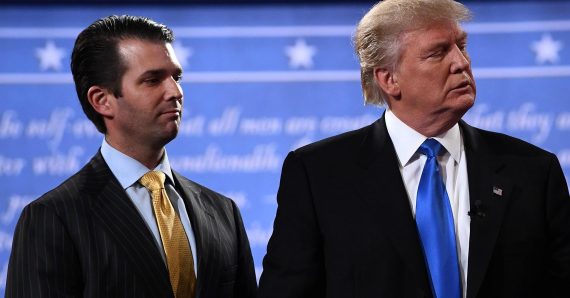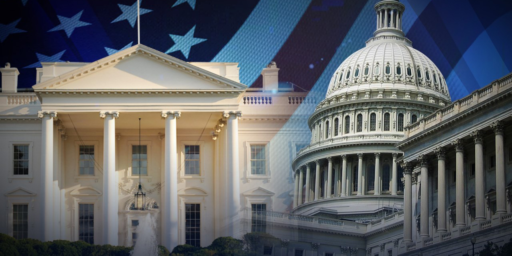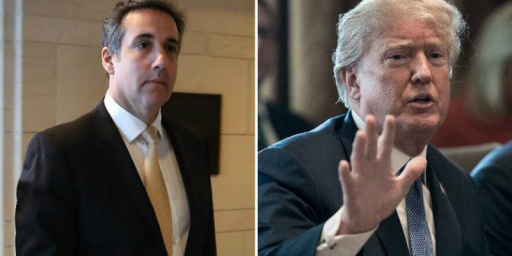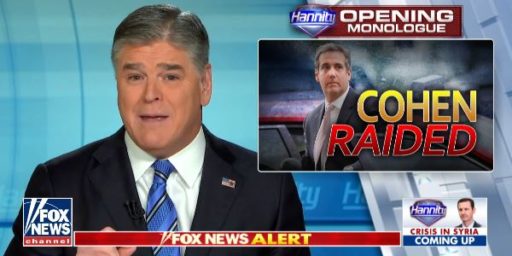Trump, Trump Jr., And The Attorney-Client Privilege
Donald Trump Jr. is claiming that some conversations between him and his father are covered by the attorney-client privilege. Based on what we know about those conversations, there's a good possibility that he's right.
Donald Trump Jr. appeared behind closed doors before the Senate Intelligence Committee in connection with its Russia investigation and reportedly invoked attorney-client privilege to decline to answer questions regarding his conversations with his father in the wake of his June 2016 meeting with a Russian lawyer who had been initially said to have compromising information about Hillary Clinton:
WASHINGTON — Donald Trump Jr. refused on Wednesday to provide a congressional committee details of a July telephone conversation with his father about a meeting last year at which Trump campaign officials had expected to receive damaging information from the Russian government about Hillary Clinton.
Testifying in a closed session before the House Intelligence Committee, Mr. Trump claimed that his conversation over the summer with his father, two days after The New York Times disclosed the June 2016 meeting at Trump Tower in Manhattan, was protected under attorney-client privilege because lawyers for both men were on the call.
What, if anything, Donald J. Trump knew about the Trump Tower meeting as a presidential candidate — and his role in drafting a misleading statement about it once he was president and it became public — are key questions for the special counsel, Robert S. Mueller III, who is investigating Russian interference in the election.
Donald Trump Jr. had agreed to the meeting after receiving an email stating that a Russian government lawyer would provide incriminating facts about Mrs. Clinton as “part of Russia and its government’s support for Mr. Trump.” He has said that no damaging information was delivered.
Representative Adam B. Schiff of California, the top ranking Democrat on the Intelligence Committee, said after Wednesday’s session that Donald Trump Jr. acknowledged that he had discussed the Trump Tower meeting by telephone with his father on July 10. The congressman said that Mr. Trump’s lawyer, Alan S. Futerfas, asked the committee for more time to answer questions about that conversation because both he and a lawyer for the president were privy to it.
Mr. Schiff said that he believed the contents of the phone call should not be kept secret simply because lawyers participated in it. “The presence of counsel does not make communications between father and son a privilege,” he said. He added that he would follow up with Mr. Futerfas about the legal basis for refusing to disclose what was discussed.
The conversations that Trump Jr. may have had with his father after the June 2016 meeting are of interest to investigators primarily due to the fact that the younger Trump went into this meeting on the presumption that the Russian lawyer he would be meeting with had connections to the Russian government and that the purpose of the meeting was to discuss potentially damaging information about Hillary Clinton. Prior to this, of course, we had learned about the now famous meeting in Trump Tower between Trump Jr., Paul Manafort, and Jared Kushner, and a lawyer with ties to the Russian government. During that meeting, the lawyer in question recently stated that Trump Jr. offered a quid pro quo in exchange for damaging information about Clinton. Initially, of course, the Trump White House and Trump Jr. claimed that the meeting was about the sanctions imposed by the so-called Magnisky Act and the issue of the adoption of Russian babies by American citizens, which was in limbo in wake of the sanctions imposed after Russia’s annexation of the Crimean region of Ukraine. In fact, as we learned later, the President himself participated in drafting a statement that made this claim on the way home from a trip to Europe on Air Force One. Very quickly, though, it became evident that these claims were untrue after Trump Jr. released a string of emails between himself and other campaign officials regarding the meeting. Those emails made it clear that purpose of the meeting was based on the claim that the Kremlin-linked lawyer could deliver damaging information about Hillary Clinton, a prospect that elicited a response from Trump Jr. that said: “Sounds great!”
Given all of this, the conversations that Trump Jr. may have had with his father both before and after this meeting are relevant to the Russia investigation because they go to the question of what Trump may have known about efforts by high-ranking officials in his campaign about contact with Russian officials and when he may have known it. In that regard, it’s worth remembering that immediately prior to this June 2016 meeting Trump Sr. had eluded in campaign speeches to damaging information about Clinton that was about to drop, and there were similar hints being made on Twitter by Roger Stone, who used to work on Trump’s campaign and still had a close relationship with him, about information about Clinton coming from Wikileaks and other sources. Was Trump eluding to the meeting in question? And, if so, what did he know about its purpose prior to the time it occurred and what actually happened at that meeting? Additionally, exactly what role did Trump play in drafting the statement that was initially released earlier this year that claimed, incorrectly, that the intent of the meeting had been to discuss the adoption of Russian orphans by American couples and the restrictions that had been placed on that program in the wake of the Russian takeover of Crimea?
The question of whether or not the attorney-client privilege applies to a given situation is often a complicated one, but it is also usually a question that courts end up deciding in favor of maintaining the privilege. As a general rule, of course, the privilege means that conversations between a client and his or her attorney are privileged and cannot be revealed in Court or in any other proceeding of a legal nature such as a Congressional investigation. Obviously, the privilege would not apply if Trump Jr. had a conversation with his father or with his father and other non-attorney parties. If none of the parties are attorneys then there is obviously no privilege. Additionally, a conversation that includes a party and his attorney along with a third party that the attorney does not represent would generally not be considered privileged. In this case, however, it appears from reports that Trump Jr. is claiming that the conversation that took place before the White House statement regarding the Trump Tower meeting that was released earlier this year was between the President and his attorney and Trump Jr. and his attorney. If this is the case, then I believe that a strong argument can be made that the privilege would remain in place because the argument could be made that the two parties, and their respective attorneys, were working pursuant to a common defense strategy and discussing matters that should be considered legally privileged. If, on the other hand, there were any non-represented parties present for all or part of this conversation then at least that portion of the conversation would not be protected by privilege and could not be revealed or compelled.
Ken White at Popehat has a “Lawsplainer” post discussing this matter in further detail, but it’s worth highlighting two of the points he makes:
[I]n general, the communication has to be confidential to be privileged. That means you have to intend that it be confidential and in fact keep it confidential. The presence of other people outside the attorney-client relationship prevents the privilege from attaching. That’s the core of the rule. That’s why people with entourages make very difficult clients.
But there are exceptions. Translators don’t destroy the privilege — they are there to empower the communication. Nor do other people who are there for the purposes of facilitating the communication. So if Don Jr. generally communicates in clicks and grunts and only Don Sr. can coax him into complete sentences, Don Sr.’s presence to help Don Jr. communicate with his lawyer doesn’t destroy the privilege. After that it gets cloudy. Having your spouse in the room may or may not destroy the privilege depending on the nature of the advice and the jurisdiction. Same with other family members — some courts find that the communication was still privileged because the family member agreed to keep the communication confidential and was there to facilitate the communication, some don’t. It’s a risk to have other people in the room, and many attorneys — like me — will send even a client’s spouse out of the room during key parts of a conference.
The same thing goes with lawyers. If someone else’s lawyer is in the room, that normally means that your communication with your lawyer isn’t privileged.
But . . . . there’s also a thing called the “joint defense privilege” or “common interest privilege.”
The question then is whether there is some kind of joint defense agreement between the Trump and Trump Jr. legal teams, and whether that agreement was in place at the time this particular conversation took place. If it was, then there would seem to be a strong argument in favor of finding that the privilege exists. Beyond that, as White also notes, there’s a question of whether or not anyone actually can invoke the privilege before Congress:
[I}t’s not clear what happens when you invoke the privilege before Congress. Congress is cagey about whether it recognizes the attorney-client privilege as applying to its inquiries. In typical Congressional fashion, it hasn’t made a clear rule, but sometimes Congress acts as if it does not recognize the privilege, and sometimes it acts as if it can use some sort of balancing test — the need for the information versus the interests of the witness — to decide if the privilege applies. And it’s not clear to what extent courts can review Congress’ refusal to recognize the attorney-client privilege. It’s kind of a mess.
In the end, this is a matter that would have to be resolved by the courts, assuming that either the committee or special counsel Mueller want to pursue the matter. The court would then be called upon to consider whether or not the conversation at issue fell within the boundaries of what is covered by the privilege and, if it does, then the content of those conversations could not be compelled. If the Court decides on the other hand that either all or part of the conversation was not privileged, then Trump Jr, would have to disclose the conversation or be held in contempt for failure to do so. In either case, it could be some time before the matter is resolved while the rest of the investigation moves forward.
Update: This post was updated to include the excerpts from Ken White’s post.







My guess is that Mueller won’t be derailed by Denture-Don’s dodge.
Collusion comes into sharper focus with every passing day.
The Flynn stuff lays out the quid-pro-quo…it’s all about sanctions.
While I have not seen any reports about the specifics of the Senate Intelligence Committee’s interview with Jr., I assume that a lawyer was asking the questions on its behalf. Schiff certainly is a lawyer. Wouldn’t the first series of questions of Jr. concern when, where and who were involved in his discussion with daddy? That would have established either the conversation could have been privileged or it couldn’t be privileged.
@dmichael:
Trumplicans won’t release a transcript of the interview so we cannot know the details.
Under the rules of the Committee, the only thing that Schiff was free to discuss was what Donnie Jr. refused to answer.
Schiff did seem pretty clear, in interviews I have seen, that there was no legitimate Attorney/Client privilege to be invoked.
If I understand this correctly, you’re saying that it’s probable that any conversation in which each party has a lawyer present would be protected by attorney-client privilege?
That seems like a pretty big loophole….Does that mean that any time a ‘hypothetical person’ (totally not me) wanted to plan something really evil, I just have to make sure that all of my nefarious guests also have their lawyers present, and then voila, the entire proceedings of the meeting are covered under attorney client privilege?
I’ll have to remember that next time
I ama hypothetical person is organizing the yearly meeting in which United Airlines, Delta, etc. fix prices for domestic flights….Common interest privilege is definitely a thing. Lawyers for co-parties with common positions in a case invoke it all the time. But I am not sure it can be invoked when there is no litigation present or pending. Also, when I deal with other lawyers in such a manner we often have a written acknowledgment of common interest privilege.
In this case, they were planning an action. You can’t insulate an illegal act by having a lawyer present for the conspiratorial discussions.
@CET:
There are many exceptions to the privilege that I didn’t get into in the post (although I may address them in a future post if this Trump Jr. thing becomes a part of a legal proceeding). Among them is the fact that there are ethical rules that would apply if an attorney were effectively helping their client commit a crime, some of which would require that the attorney disclose those conversations.
As I kind of hint at in the post, it is a bit of a complicated issue that would require a judge to hear testimony (behind closed doors) to resolve. Based solely on what we know right now about the conversation at issue here, though, it does appear that there’s a strong argument in favor of the invocation of the privilege.
Pylon,
Yes, that is potentially an issue here.
Further to my post, it seems that common interest privilege was briefly accepted in a transaction, non-litigation context, but has now been rejected in Canada and in the US:
https://www.osler.com/en/resources/regulations/2016/deal-privilege-may-no-longer-protect-shared-legal
http://www.blakesbusinessclass.com/common-interest-privilege-in-cross-border-matters-canada-vs-u-s-law/
Recently, the New York Court of Appeals held that the common interest doctrine applies only where a reasonably anticipated litigation is involved.
In Ambac Assurance Corp. v. Countrywide Home Loans, Inc., Bank of America and Countrywide claimed privilege over documents involving pre-closing matters of common interest between the parties during a period in which parties signed a merger agreement. The merger agreement in question contained both a confidentiality clause as well as a common interest agreement that was intended to protect communications between the companies regarding matters relating to the merger, including employee benefit plans, legal advice on tax issues, etc.
While the lower courts allowed the common interest exception to apply, the court of appeals reversed the broader application of the common interest doctrine.
I have updated the post to include a broader discussion of some of the issues involved here.
A talking head just said there’s a legal term for what Don Jr. did, “chutzpah”. The other term that comes to mind is “desperation”. Might as well wear a sign reading “GUILTY”.
The legal path forward, if any, is not at all clear. Who sues who?
I came across an interesting point over at Vox:
https://www.vox.com/2017/12/7/16745744/donald-trump-jr-lawyer-attorney-client-privilege
My emphasis:
No, no, no.
This is how you use attorney-client privilege.
Get a political campaign (say, Hillary Clinton’s presidential campaign) to hire a law firm (say, Perkins Coie) and give them a bunch of money. Then have that law firm hire an opposition-research firm (say, Fusion GPS), who then pays the money to have a fake dossier that is passed off as a genuine intelligence document (say, the Pee-Pee Dossier).
That way, with the law firm in the middle, you can argue that all the communications are covered by lawyer-client privilege and you don’t have to admit that you paid for the BS document that was shopped all around (and laughed at) until someone got the bright idea to have it shown to Trump — and then leak the briefing, making the whole thing a “legitimate news story.”
For bonus points, use the BS dossier as fodder to get FISA warrants on Trump’s top people, then leak info garnered thus (and the fact that they are being watched as part of a national-security investigation into foreign influence on the election). With a cooperative enough media, you can build an entire fake news story out of literally nothing at all.
For bonus points, point out that both Huma Abedin and Cheryl Mills told the FBI that they didn’t know about Hillary’s email server until after she left the Secretary of State’s office, but in emails from that time discussed said server. Naturally, they weren’t charged with lying to the FBI because SHUT UP YOU RACIST SEXIST FASCIST HATER.
Bob, your comment finally made sense in the last 7 words!
Keep whistling past that graveyard…apart from the Clinton haters, no one really cares about Hillary Clinton’s campaign…meanwhile, Mueller is closing in on the Orange Mange…be prepared to shed some bitter tears in the near future…
@the Q: Thanks! That’s when I switched from English to Progressive Blather. Nice to know I spoke the lingo well enough for you to understand it.
@An Interested Party: So, just how do you square “Russian Collusion!!!!!” with “pay no attention to who paid for the biggest piece of evidence, which was pure BS?” That’s quite the feat of mental gymnastics there, sport…
And Mueller is rather busy right now finally noticing that his hand-picked staff is filled with hard-core Trump haters who’ve been extremely careless about keeping even a semblance of objectivity in this investigation. He’s lost Peter Strzok, his key henchman who has been demoted and reassigned for major ethics violations. Mueller’s right-hand man Andrew Weissmann has been caught expressing his eternal admiration for Sally Yates, the Obama holdover who tried to scuttle Trump’s travel ban (and was both overturned and fired for her ego-driven defiance).
Here’s a refresher: Strzok was the FBI agent who rewrote Comey’s memo to remove the legally-loaded phrase “grossly negligent” to the more benign “extremely negligent” when describing Hillary’s handling of classified material. Strzok was also having an affair with an FBI lawyer (a violation of regulations, making him a security risk) with whom he was exchanging rather vehement anti-Trump emails. When that all came out, Mueller had no choice but to get rid of Strzok — without telling Kelly’s lawyers that the guy who conducted the non-recorded interview with Kelly had been dismissed for bias against Trump and his people.
There are a few who think that that omission could nullify Kelly’s conviction entirely.
Mueller’s getting close to being told to clean his team out of grossly biased staffers and limit it to just professional, unprejudiced investigators. And that’s going to be a problem, because he went out of his way to fill the team with pro-Hillary Trump haters.
So. who’s whistling past the graveyard here?
@Bob The Arqubusier: And your sources for the information you present? I suppose any Trump supporter thinks this all will blow over into nothing, certainly we shall see…
@An Interested Party: The proof is the one staffer who was removed for having sent texts that put Trump in a negative light. See in the world of a Trump supporter the removal of a potentially biased individual from the investigation is proof that ALL OF THEM ARE TERRIBLY BIASED AGAINST DEAR LEADER!!!!!!
Oh and the fact that these guys are going after Trump instead of Killary whose email server caused benghazi!!!!
@An Interested Party: Here’s the current highlights of Mueller’s all-star team of totally objective professional investigators:
–Aaron Zebley, who formerly represented Justin Cooper during the Hillary email investigation. Cooper was the guy who set up the server AND personally took a hammer to Hillary’s old Blackberries. Zebley repeatedly stonewalled the committee to keep them from properly investigating the matter.
–Jeannie Rhee: formerly personal attorney of Ben Rhodes, former top aide to Obama and fondler of Hillary cutouts.
–Andrew Weissmann: attendee of Hillary’s
victoryWTF happened party on election night. When Acting AG Sally Yates improperly defied Trump’s first travel ban, Weissmann sent her an email: “I am so proud. And in awe. Thank you so much.”And that’s in addition to the aforementioned Mr. Strzok, whose bias was so egregious he had to be kicked off the team. But whose removal wasn’t important enough to tell Kelly’s lawyers, after Strzok played a critical role in the Kelly investigation.
All that info is out there, if you are willing to pry your head out of… the sand. But it’s clear that that’s the last thing you want to do.
—
As opposed to you, someone who has his head completely submerged in the fever swamp…thanks for all the links to all the “proof” you have of the supposed misdeeds of Mueller’s team…I’m sure he’s just so worried that he won’t be able to make his case…
@An Interested Party: Notice how Bob can only see everything through a partisan lense. He looks at Hillary sees the D next to her name and thus decides she’s guilty. Everything else is him going backwards to prove she’s guilty. They don’t really understand the concept of following the evidence where it points.
@Bob The Arqubusier: Aaron Zebley was doing his job as a lawyer. It’s bullshit to try to slander someone just based on one of his MANY clients. BTW Justin Cooper was well within the law. Those phones were old and smashed well before the relevant time frame. Data could still be easily recovered as it’s the SD card and the onboard memory chips that hold the important stuff and merely breaking a phone in half doesn’t destroy that.
The picture in your link is of Jon Favreau not Ben Rhodes or Jeannie Rhee. There’s absolutely no relevance to the subject at hand. It’s clear that you can’t be bothered to do any real work to back up your beliefs. It’s also clear that I’m wasting my time even bothering with your pile of steaming crap..